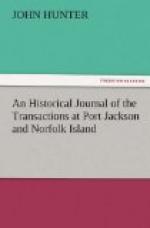The natives here, appear to live chiefly on the roots which they dig from the ground; for these low banks appear to have been ploughed up, as if a vast herd of swine had been living on them. We put on shore, and examined the places which had been dug, and found the wild yam in considerable quantities, but in general very small, not larger than a walnut; they appear to be in the greatest plenty on the banks of the river; a little way back they are scarce.
We frequently, in some of the reaches which we passed through this day, saw very near us the hills, which we suppose as seen from Port Jackson, and called by the governor the Blue Mountains.
At five in the evening, we put ashore at the foot of a hill, where we passed the night; and at day-light in the morning of the 5th, we embarked, and continued our way up the river; in which we still found good depth of water, from two to five fathoms, and 60 or 70 fathoms wide. As we advanced, we found the river to contract very fast in its breadth, and the channel became shoaler; from these circumstances, we had reason to believe that we were not far from its source: the ebb tides were pretty strong, but the floods were only perceptible by the swolling of the water.
In the evening we arrived at the foot of a high mountain, which was spread over with Iofty trees, without any underwood; and saw a pleasant looking country, covered with grass, and without that mixture of rocky patches in every acre or two, as is common in many other places: we ascended some distance, and erected our tents for the night. The river here is not more than twenty fathoms wide. In the night, when every thing was still, we heard distinctly the roaring of what we judged to be a fall of water; and imagined from this circumstance, that we should not be able to advance much farther.
In the morning, we walked to the top of the hill, and found we were not more than five or six miles from a long range of mountains, between which, and that where we stood, there is a deep valley, or low country, through which, probably, a branch of this river may run. This range of mountains we supposed to be those which are seen from Port Jackson, and called the Blue Mountains: they limit the sight to the west-north-west. In that range of high land there is a remarkable gully, or chasm, which is seen distinctly at a distance, and from which we appeared to be distant about five miles. The hills on each side of this gap were named by Governor Phillip; on one side the Carmarthen, on the other, the Lansdown hills; and that on which we stood was called Richmond-hill.
In the morning of the 6th, we examined the river, which, as I have before observed, was narrow and shoally; its bed was composed of loose round stones and sand: it was now low water, and not a sufficient depth to float the boats: we therefore delayed any farther attempt to get up until it should be near high water; and, in the mean time, determined to take a view of the country round this hill; which, had it been clear of trees, would from its commmanding height, have given a most extensive prospect to the eastward, northward, and southward; but the range of hills before-mentioned were still higher, and of course limited our view to the westward.




